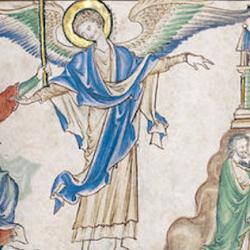The neatly structured song of the martyrs (Revelation 15:3-4) is a turning point in the book. The first four lines are set up in two pairs. The first line describes the Lord’s works as “great and marvelous,” like the sign that John sees in heaven (v. 1). This is exodus and conquest language. The Lord exerts His power, and the titles that follow in the second line are consistent with this. He is Lord, God, Almighty (pantokrator). The second two lines run parallel to the first couplet. First two attributes are named – God is just and true – and then a title is given, “King of the nations” or “King of the ages.” Overall:
A. Great and marvelous
B. works
C. Lord, God, Almighty.
A’. Just and true
B’. ways
C’. King of nations/ages.
From these first two couplets, we have little theology proper. God has works and ways. His works are great and marvelous, His ways just and true. We might say that there are four attributes: great, marvelous, just true. And we also have four titles: Lord, God, Almighty, King.
The end of the song has two clauses that begin with “because.” All nations will come to worship before the Lord. This will fulfill the promises of the prophets, rooted in the promise to Abraham, that all the nations will be blessed in the seed of Abraham. And the nations will come and worship the Lord because His judgments, His just-deeds, have been revealed and uncovered. So the clauses at the end refer back to the great and marvelous works of the Lord, and to the justice of His ways. What they are celebrating is the revelation, the unveiling of that justice.
At the center of the passage, between the two sets of couplets., is a question that resembles the questions of the song of Moses in Exodus 15: Who will not fear and glorify you, Lord, because you along are holy.
This can be seen as a modified chiasm:
A. Great and marvelous works
B. Lord, God, Almighty
C. Just and true your ways
D. king of nations
B’. Who will not fear you Lord
D’. nations will worship
C’. because your judgments
A’. Revealed
Now, remember what provoked this song of praise at the beginning. The “great and marvelous work” that reveals the “justice and truth” of the Lord, God, Almighty King is the harvest of the saints and the preparation of wrath blood. By their deaths, the martyrs have been vindicated and elevated.
This is the first time in Revelation that the work “righteous” has been used (dikaios). After this, the term becomes fairly common, sometimes in conjunction with alethinos, “true” (16:5, 7; 19:2; 22:11). The Lord’s true and righteous judgments are manifest in the overthrow of the harlot city (19:2). The noun dikaiosune is used only twice in Revelation, in 19:11 and 22:11. This is the first revelation of God as a just God. The justice that is revealed in the gospel is revealed in His faithfulness to His witnesses. Until they are vindicated, the righteousness of God has not been fully revealed.
There is an intriguing shift in the language of Revelation. Nearly all the forms of dik– or “justice” terms are negated in the first half of revelation (2:11; 6:6; 7:2, 3; 9:4, 10, 19; 11:5). The only exception of any weight is 6:10, where the martyrs cry out for justice. After 15:3, though, the uses are predominantly positive, the only exception being 18:5, describing the iniquities of the harlot city, and 22:11, let the one who does injustice continue to do injustice. But the root is used positively seven times (15:3, 4; 16:5, 7; 19:2, 8, 11).
The elevation of the martyrs, their “justification,” answers the cry for justice in chapter 6, and once the martyrs are vindicated, the Lord’s justice becomes manifest.










